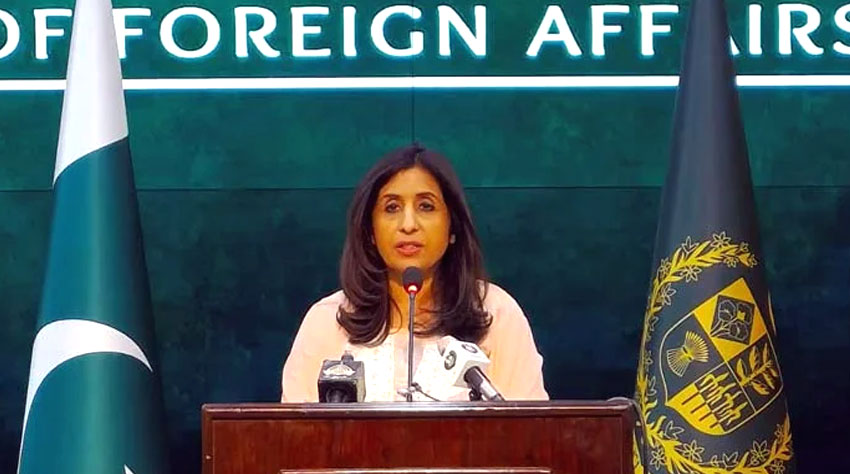
[ad_1]
ISLAMABAD: Islamabad rejected the United Nations Human Rights chief Volker Türk’s statement regarding the newly enacted 26th Constitutional Amendment, labeling it as based on “misinformation”.
During a weekly press briefing in Islamabad, the Foreign Office Spokesperson Mumtaz Zahra Baloch asserted that the statement by the Office of the High Commissioner for Human Rights was based on an inaccurate understanding and had drawn unwarranted and misplaced conclusions.
Answering the question, the spokesperson said that the High Commissioner’s remarks were based on media reports, social media posts, and speculative analysis of a manifestly political nature.
“We, therefore, reject baseless insinuations and advise the Office of the High Commissioner for Human Rights to focus on actual and grave situations of human rights violations where either the international human rights law has been rendered ineffective or draconian laws have been enacted to oppress the illegally occupied peoples,” she added.
Earlier, the United Nations High Commissioner for Human Rights voiced concerns that the constitutional amendments would seriously “undermine” the independence of the judiciary in Pakistan.
In a statement, the UN official said “latest constitutional amendments – “adopted hastily”, without broad consultation and debate – will seriously undermine the independence of the judiciary.” “Constitutional reforms must be in line with international human rights law,” the UN Human Rights office added.
#Pakistan: @volker_turk concerned that latest constitutional amendments – adopted hastily, without broad consultation and debate – will seriously undermine independence of the judiciary.
Constitutional reforms must be in line with international human rights law. pic.twitter.com/1WvDelniBV— UN Human Rights (@UNHumanRights) October 22, 2024
When asked about the letter written by US Congressmen in favor of PTI founder Imran Khan, the spokesperson remarked that the comments on Pakistan’s domestic affairs are contrary to inter-state conduct and diplomatic norms.
Baloch added that Pakistan believes such letters and statements are counter-productive and not in line with the positive dynamics of Pakistan – US bilateral relations.
“These letters are also based on an incorrect understanding of the political situation in Pakistan. We hope that the US Congress will play a supportive role in strengthening Pakistan – US ties and focus on avenues of mutual collaboration that benefit both our peoples and countries,” a FO spokesperson said while responding to a query.
During the press briefing, the spokesperson termed the recent blacklisting of approximately two dozen companies by the United States (US) as “biased” and “politically motivated”. She noted that similar listings in the past were based on mere suspicion.
“It is widely known that some countries while claiming strict adherence to Non-Proliferation norms, have conveniently waived licensing requirements for advanced military technologies to their favorite nations,” Mumtaz Zahra Baloch added.
The spokesperson further said that such double standards and discriminatory practices undermine the credibility of the global Non-Proliferation regimes, increase military asymmetries, and endanger international peace and security.
Foreign Office spokesperson also confirmed that Prime Minister Shehbaz Sharif has written a letter to US President Joe Biden, requesting favorable consideration of Dr Aafia Siddiqui’s mercy petition on humanity grounds. She stated that Pakistan has been in contact with the US State Department to extend all possible support for Dr Siddiqui’s welfare.
“Our Missions in Washington and Houston have also remained in continuous contact with the family of Dr. Aafia Siddiqui and her legal team,” she confirmed.
[ad_2]
Source link






